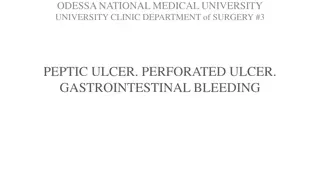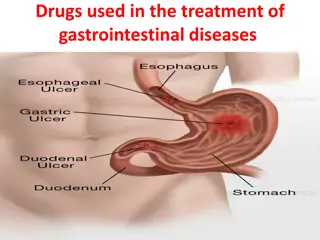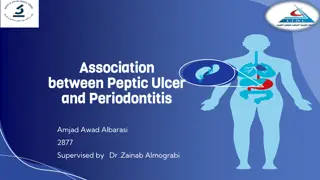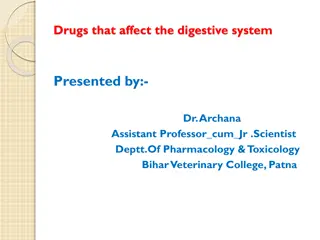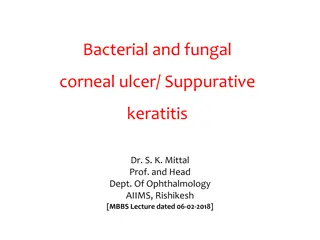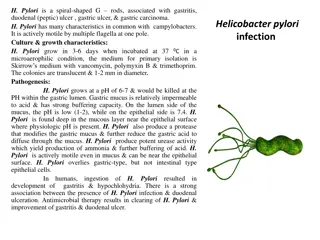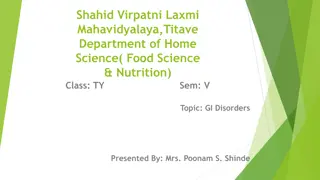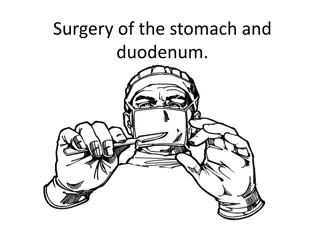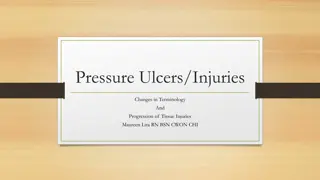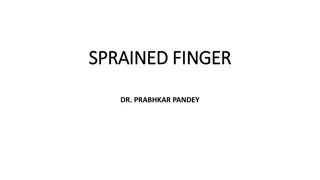Understanding Peptic Ulcers: Causes, Symptoms, and Treatment
Peptic ulcers are open sores that form in the stomach or upper small intestine, leading to symptoms like stomach pain, bloating, and nausea. Common causes include H. pylori infection and NSAID use. Recognizing symptoms, such as burning stomach pain, is crucial for timely diagnosis and management. Severe signs like blood in vomit or stools require immediate medical attention. Treatment involves medications to reduce acid and promote healing, along with lifestyle changes. Understanding the causes and symptoms of peptic ulcers can help in prevention and effective management.
Uploaded on Sep 16, 2024 | 0 Views
Download Presentation

Please find below an Image/Link to download the presentation.
The content on the website is provided AS IS for your information and personal use only. It may not be sold, licensed, or shared on other websites without obtaining consent from the author. Download presentation by click this link. If you encounter any issues during the download, it is possible that the publisher has removed the file from their server.
E N D
Presentation Transcript
PEPTIC ULCER By Aamena Zaidi Assistant Professor Department of Nutrition Science School of Health Science CSJM University, Kanpur
Peptic ulcers are open sores that develop on the inside lining of your stomach and the upper portion of your small intestine. The most common symptom of a peptic ulcer is stomach pain. Peptic ulcer include: 1-Gastric ulcers that occur on the inside of the stomach 2-Duodenal ulcers that occur on the inside of the upper portion of your small intestine (duodenum)
The most common causes of peptic ulcers are infection with the bacterium Helicobacter pylori (H. pylori) and long-term use of nonsteroidal anti-inflammatory drugs (NSAIDs) such as ibuprofen (Advil, Motrin IB, others) and naproxen sodium (Aleve). Stress and spicy foods do not cause peptic ulcers. However, they can make symptoms worse.
SYMPTOMS Burning stomach pain Feeling of fullness, bloating or belching Intolerance to fatty foods Heartburn Nausea
The most common peptic ulcer symptom is burning stomach pain. Stomach acid makes the pain worse, as does having an empty stomach. The pain can often be relieved by eating certain foods that buffer stomach acid or by taking an acid-reducing medication, but then it may come back. The pain may be worse between meals and at night. Many people with peptic ulcers don't even have symptoms.
Less often, ulcers may cause severe signs or symptoms such as: Vomiting or vomiting blood which may appear red or black Dark blood in stools, or stools that are black or tarry Trouble breathing Feeling faint Nausea or vomiting Unexplained weight loss Appetite changes
CAUSES Peptic ulcers occur when acid in the digestive tract eats away at the inner surface of the stomach or small intestine. The acid can create a painful open sore that may bleed. Digestive tract is coated with a mucous layer that normally protects against acid. But if the amount of acid is increased or the amount of mucus is decreased, ulcer may develop.
Common causes include A bacterium-Helicobacter pylori bacteria commonly live in the mucous layer that covers and protects tissues that line the stomach and small intestine. Often, the H. pylori bacterium causes no problems, but it can cause inflammation of the stomach's inner layer, producing an ulcer.
Regular use of certain pain relievers-Taking aspirin, as well as certain over-the- counter and prescription pain medications called nonsteroidal anti-inflammatory drugs (NSAIDs) , can irritate or inflame the lining of stomach and small intestine. These medications include ibuprofen (Advil, Motrin IB, others), naproxen sodium (Aleve, Anaprox DS, others), ketoprofen and others.
Other medications-Taking certain other medications along with NSAIDs, such as steroids, anticoagulants, low-dose aspirin, selective serotonin reuptake inhibitors (SSRIs), alendronate (Fosamax) and risedronate (Actonel), can greatly increase the chance of developing ulcers.
RISK FACTORS Smoke-Smoking may increase the risk of peptic ulcers in people who are infected with H. pylori. Drink alcohol-Alcohol can irritate and erode the mucous lining of stomach, and it increases the amount of stomach acid produced. Have untreated stress. Eating spicy foods.
COMPLICATIONS Internal bleeding-Bleeding can occur as slow blood loss that leads to anaemia or as severe blood loss that may require hospitalization or a blood transfusion. Severe blood loss may cause black or bloody vomit or black or bloody stools. A hole (perforation) in stomach wall-Peptic ulcers can eat a hole through (perforate) the wall of stomach or small intestine, putting at risk of serious infection of abdominal cavity (peritonitis). Obstruction-Peptic ulcers can block passage of food through the digestive tract, causing to become full easily, to vomit and to lose weight either through swelling from inflammation or through scarring. Gastric cancer-Studies have shown that people infected with H. pylori have an increased risk of gastric cancer.
DIETARY MANAGEMENT 1-Dietary Fibre and Vitamin A Research shows that a high fibre diet decreases the risk of developing ulcer disease. Although both insoluble and soluble fibres demonstrate this association, there is a stronger association between diets high in soluble fibre and a decreased risk for developing ulcers. Foods that are high in soluble fibre include oats, psyllium husk, legumes, flax seeds, barley, nuts, and certain vegetables and fruits, such as oranges, apples, and carrots.
Animal studies demonstrate that vitamin A increases the production of mucus in the gastrointestinal tract. Impaired mucosal defence can allow ulcers to develop. Therefore, vitamin A may have a protective effect against the development of ulcer disease. Good sources of vitamin A include liver, carrots, broccoli, sweet potatoes, kale, spinach, and collard greens.
2-Green Tea and Flavonoid-Rich Foods Emerging research from China shows the potential protective effects of green tea and other foods that are rich in flavonoids against chronic gastritis, H. pylori infection, and stomach cancer. Specifically, these foods seem to inhibit the growth of H. pylori. In addition, one recent laboratory study of green, white, oolong, and black teas indicated that these teas inhibit the growth of H. pylori but cause no harm to beneficial types of bacteria normally found in the stomach, including L. acidophilus, L. plantarum, and B. lungum. Flavonoid-rich foods include garlic, onions, and colourful fruits and vegetables such as cranberries, strawberries, blueberries, broccoli, carrots, and snap peas.
3-Coffee and Alcohol Both caffeinated and decaffeinated coffee can increase acid production and exacerbate symptoms in individuals with ulcer disease. Alcoholic beverages can erode the gastrointestinal tract and lead to further inflammation and bleeding. To minimize symptoms, individuals with ulcer disease should avoid or limit both coffee and alcohol. protective mucosal lining along the
PREVENTION Protect from infection by frequently washing hands with soap and water and by eating foods that have been cooked completely. It's not clear just how H. pylori spreads, but there is some evidence that it could be transmitted from person to person or through food and water.
Regularly use pain relievers that increase the risk of peptic ulcer. For instance, take your medication with meals. Work with doctor to find the lowest dose possible that still give pain relief. Avoid drinking alcohol when taking medication, since the two can combine to increase risk of stomach upset.


